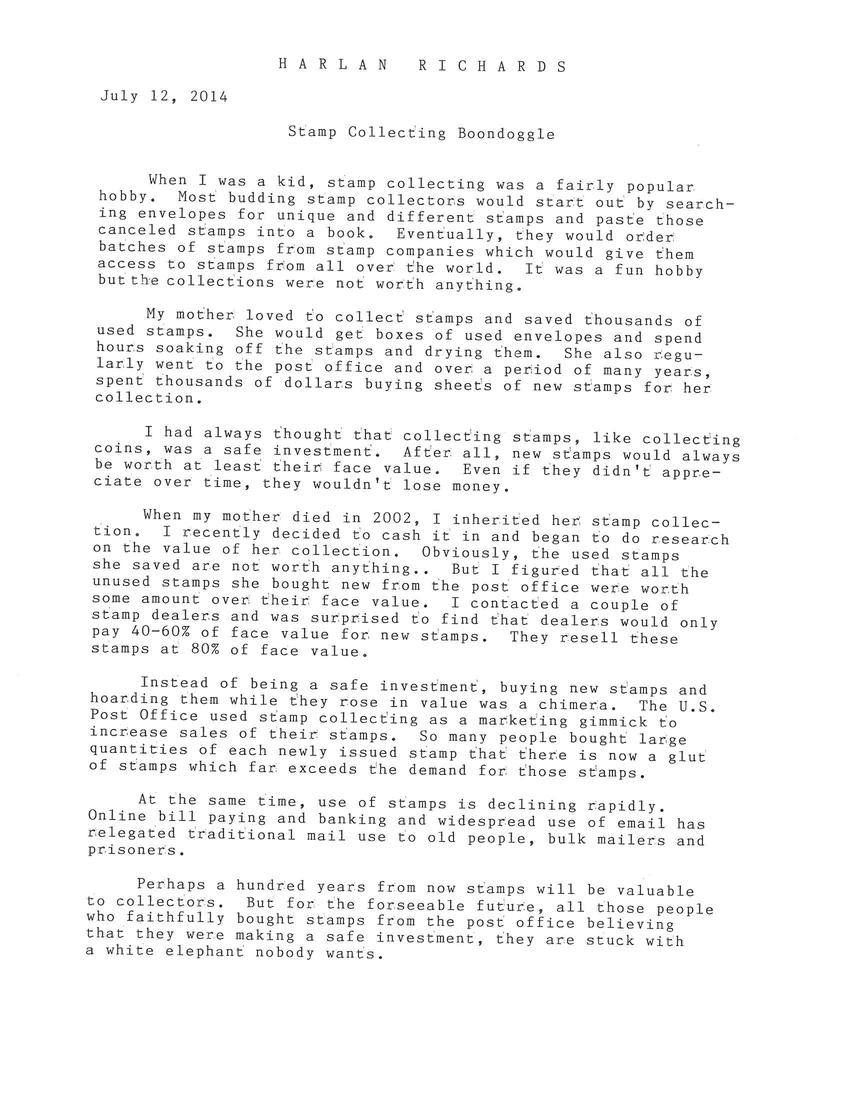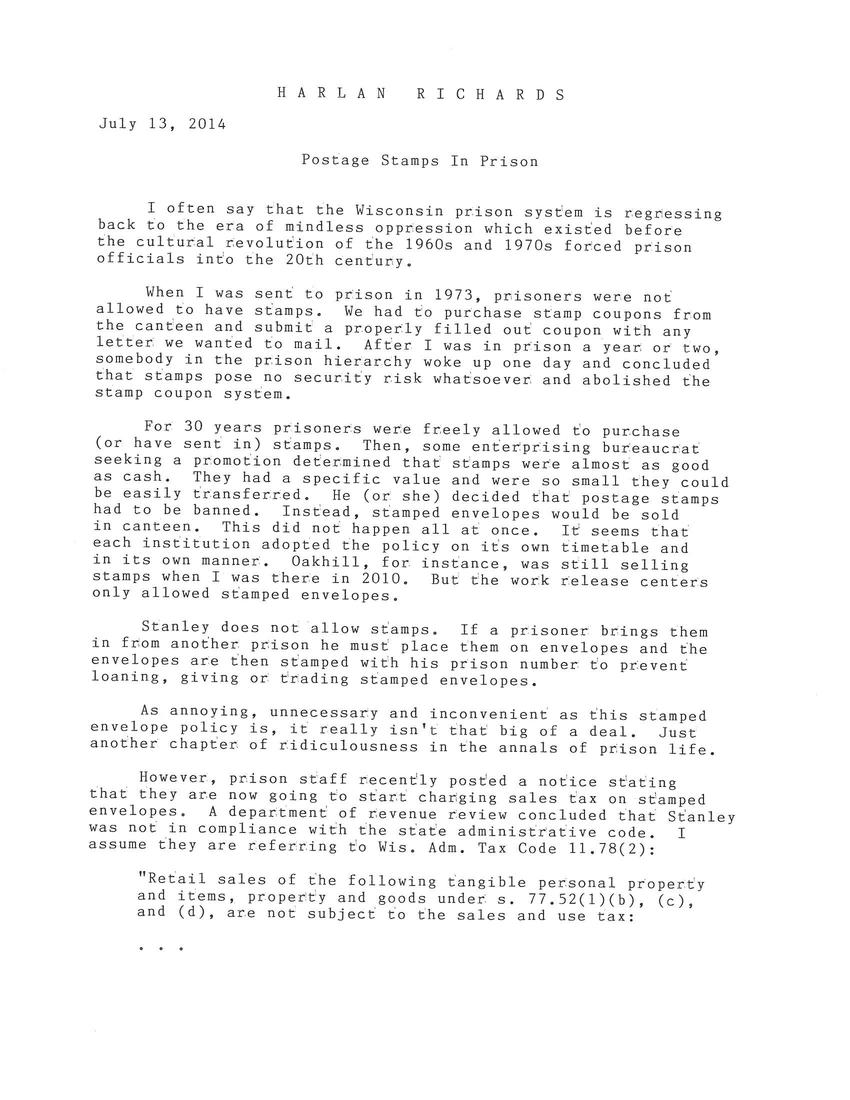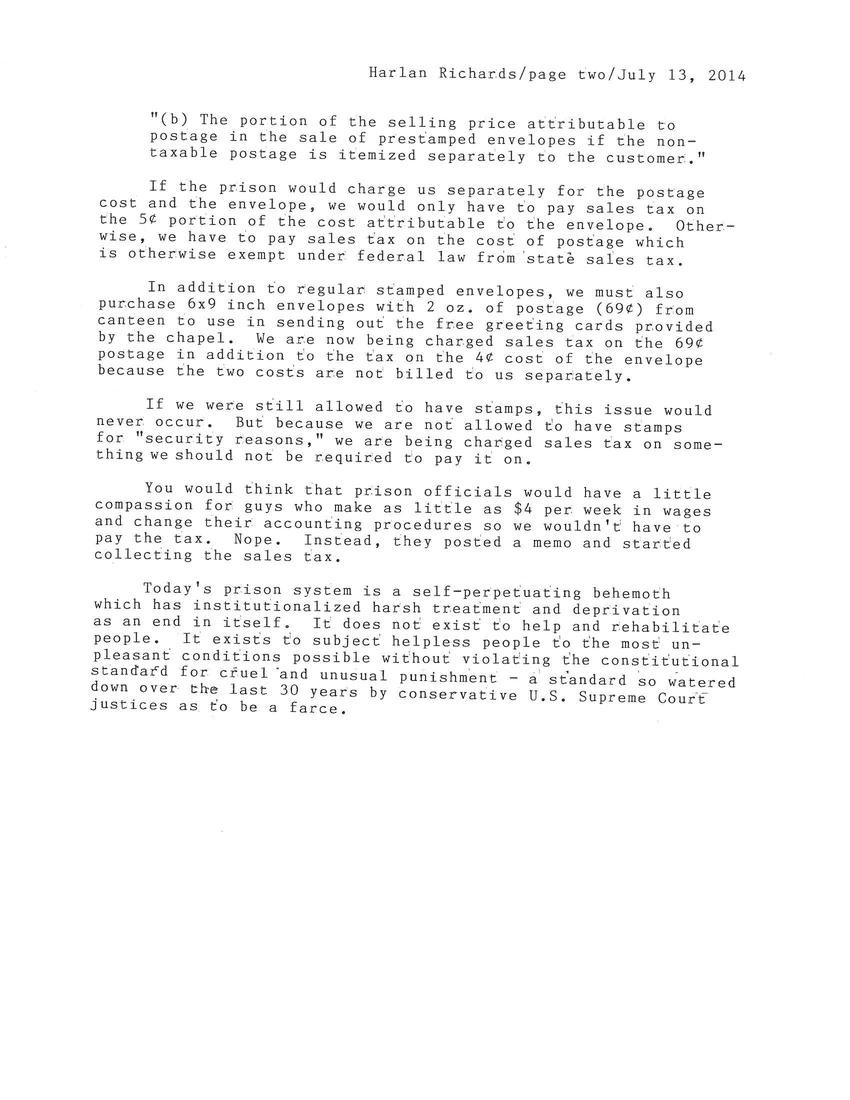
Transcription
H A R L A N R I C H A R D S
July 12, 2014
Stamp Collecting Boondoggle
When I was a kid, stamp collecting was a fairly popular hobby. Most budding stamp collectors would start out by searching envelopes for unique and different stamps and paste those canceled stamps into a book. Eventually, they would order batches of stamps from stamp companies which would give them access to stamps from all over the world. It was a fun hobby but the collections were not worth anything.
My mother loved to collect stamps and saved thousands of used stamps. She would get boxes of used envelopes and spend hours soaking off the stamps and drying them. She also regularly went to the post office and over a period of may years, spent thousands of dollars buying sheets of new stamps for her collection.
I had always thought that collecting stamps, like collecting coins, was a safe investment. After all, new stamps would always be worth at least their face value. Even if they didn't appreciate over time, they wouldn't lose money.
When my mother died in 2002, I inherited her stamp collection. I recently decided to cash it in and began to do research on the value of her collection. Obviously, the used stamps she saved are not worth anything.. But I figured that all the unused stamps she bought new from the post office were worth some amount over their face value. I contacted a couple of stamp dealers and was surprised to find that dealers would only pay 40-60% of face value for new stamps. They resell these stamps at 80% of face value.
Instead of being a safe investment, buying new stamps and hoarding them while they rose in value was a chimera. The U.S. Post Office used stamp collecting as a marketing gimmick to increase sales of their stamps. So many people bought large quantities of each newly issued stamp that there is now a glut of stamps which far exceeds and demand for those stamps.
At the same time, use of stamps is declining rapidly. Online bill paying and banking and widespread use of email has relegated traditional mail use to old people, bulk mailers and prisoners.
Perhaps a hundred years from now stamps will be valuable to collectors. But for the foreseeable future, all those people who faithfully bought stamps from the post office believing that they were making a safe investment, they are stuck with a white elephant nobody wants.
H A R L A N R I C H A R D S
July 13, 2014
Postage Stamps In Prison
I often say that the Wisconsin prison system is regressing back to the era of mindless oppression which existed before the cultural revolution of the 1960s and 1970s forced prison officials into the 20th century.
When I was sent to prison in 1973, prisoners were not allowed to have stamps. We had to purchase stamp coupons from the canteen and submit a properly filled out coupon with any letter we want to mail. After I was in prison a year or two, somebody in the prison hierarchy woke up one day and concluded that stamps pose no security risk whatsoever and abolished the stamp coupon system.
For 30 years prisoners were freely allowed to purchase (or have sent in) stamps. Then, some enterprising bureaucrat seeking a promotion determined that stamps were almost as good as cash. They had a specific value and were so small they could be easily transferred. He (or she) decided that postage stamps had to be banned. Instead, stamped envelopes would be sold in canteen This did not happen all at once. It seems that each institution adopted the policy on its own timetable and in its own manner. Oakhill, for instance, was still selling stamps when I was there in 2010. But the work release centres only allowed stamped envelopes.
Stanley does not allow stamps. If a prisoner brings them in from another prison he must place them on envelopes and the envelopes are then stamped with his prison number to prevent loaning, giving or trading stamped envelopes.
As annoying, unnecessary and inconvenient as this stamped envelope policy is, it really isn't that big of a deal. Just another chapter of ridiculousness in the annals of prison life.
However, prison staff recently posted a notice stating that they are now going to start charging sales tax on stamped envelopes. A department of revenue review concluded that Stanley was not in compliance with the state administrative code. I assume they are referring to Wis. Add. Tax Code 11.78(2):
"Retail sales of the following tangible personal property
and items, property and goods under s. 77.52(1)(b), (c),
and (d), are not subject to the sales and use tax:
. . .
Harlan Richards/page two/July 13, 2014
"(b) The portion of the selling price attributable to
postage in the sale of prestamped envelopes if the non-
taxable postage is itemised separately to the customer."
If the prison would charge us separately for the postage cost and the envelope, we would only have to pay sales tax on the 5¢ portion of the cost attributable to the envelope. Otherwise, we have to pay sales tax on the cost of postage which is otherwise exempt under federal law from state sales tax.
In addition to regular stamped envelopes, we must also purchase 6x9 inch envelopes with 2 oz. of postage (69¢) from canteen to use in sending out the free greeting cards provided by the chapel. We are now being charged sales tax on the 69¢ postage in addition to the tax on the 4¢ cost of the envelope because the two costs are not billed to us separately.
If we were still allowed to have stamps, this issue would never occur. But because we are not allowed to have stamps for "security reasons," we are being charged sales tax on something we should not be required to pay it on.
You would think that prison officials would have a little compassion for guys who make as little as $4 per week in wages and change their accounting procedures so we wouldn't have to pay the tax. Nope. Instead, they posted a memo and started collecting the sales tax.
Today's prison system is a self-perpetuating behemoth which has institutionalized harsh treatment and deprivation as an end in itself. It does not exist to help and rehabilitate people. It exists to subject helpless people to the most unpleasant conditions possible without violating the constitutional standard for cruel and unusual punishment - a standard so watered down over the last 30 years by conservative U.S. Supreme Court justices as to be a farce.
Other posts by this author
|
2021 jun 25

|
2021 may 25

|
2021 apr 23

|
2021 feb 19

|
2021 feb 17

|
2021 feb 15

|
More... |




Replies